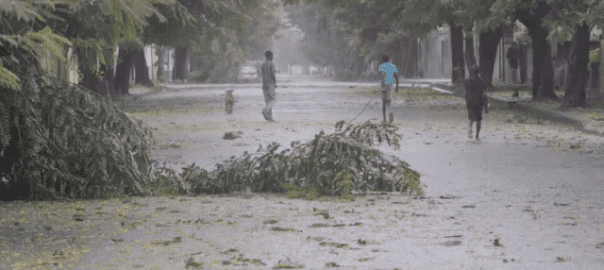|
By Megan Rowling | Just Transition Editor
Climate scientists and government officials are gathered in Switzerland this week to agree the final summary for policymakers in the latest blockbuster series of reports from the Intergovernmental Panel on Climate Change (IPCC) on global warming and how to keep it in check. Coming before an important review of global progress on climate goals at the end of this year, it doesn’t take a PhD to work out that the key message will be along the lines of “must do better”. Planet-heating emissions and fossil fuel use are still rising – as is the average global temperature. And, as the U.N. chief has reminded us, that means nearly half the global population “is living in the danger zone of climate impacts”. It’s already too late to side-step loss and damage that is already happening because of a warming climate – as seen with the longest-recorded tropical cyclone that has whipped southern African countries like Mozambique and Malawi several times in the past month. Malawi is one of six nations – along with Bangladesh, Nepal, Senegal, Trinidad and Tobago and Vanuatu – participating in a new initiative to set up national funds that will tap and work out how best to use finance to tackle growing climate-driven loss and damage. The move comes in anticipation of the global facility countries agreed on last year at the U.N. climate summit – but as well-known Bangladeshi scientist Saleemul Huq told our correspondent Tahmid Zami: “In the meanwhile, the impacts are happening and we cannot wait.” Vanuatu’s prime minister joins forces with Ugandan youth climate activist Vanessa Nakate to write for us this week on why countries must get behind his country’s bid to secure an advisory opinion on climate change and human rights in a vote at the United Nations due late this month. Cyclone Freddy hits, in Quelimane, Zambezia, Mozambique, March 11, 2023. UNICEF Mozambique/2023/Alfredo Zuniga/Handout via REUTERS |
Green garments in fashionIt’s easy to look at the massive profits being made by fossil fuel giants like Saudi Aramco and conclude there’s no hope for climate action. But if you’re stitching clothes on the factory floor of one of Bangladesh’s many fashion-manufacturing businesses, you may be seeing things shift around you. A decade after the fatal Rana Plaza collapse, we take an in-depth look at growing moves to make the garment business greener, safer and – crucially – fairer when it comes to respecting workers’ rights and ability to share in the benefits of a low-carbon transition. When Shefali Akter first sought a job at a garment factory near Bangladesh’s capital, the crowding, heavy workload and poor salary led the 19-year-old to resign after a year and return to her rural home in northern Bangladesh, reports Mosabber Hussain. But coming back to the factory with her new husband a few years later, Akter found conditions at some factories had dramatically changed for the better, with improvements ranging from free lunches and overtime pay to solar energy and water-saving measures. Why is this happening? In part because big fashion buyers like Sweden’s H&M are demanding more sustainably produced clothing – and because using renewable energy saves money. Still, labour and “just transition” experts say there’s a long way to go in terms of protecting workers from climate change impacts like rising heat and ensuring they are equipped with the green skills they’ll need to hold onto their jobs as the industry cleans up its act.
Workers finalise products at the Snowtex Outerware garment factory in Dhamrai, Bangladesh, January 30, 2023. Thomson Reuters Foundation/Mosabber Hossain |
Brazil’s land battlesAs we await the IPCC’s AR6 synthesis report, due for publication next Monday, it’s worth remembering that many of the solutions we need to stop the planet overheating already exist. One of the most obvious ones – though much harder in practice than it sounds on paper – is keeping the world’s carbon-absorbing forests standing. In Brazil’s Amazon, the bets are on new President Lula’s government making real strides towards ending rampant deforestation, though a crackdown on illegal logging and mining may take some time to bite. For now, read our explainer on how giving Indigenous people clear rights to their traditional land protects the rainforest. The downside is that Brazilian land demarcation and ownership processes are notoriously long, complex and open to exploitation, as we’ll be reporting on again soon. |



.jpg/640w)